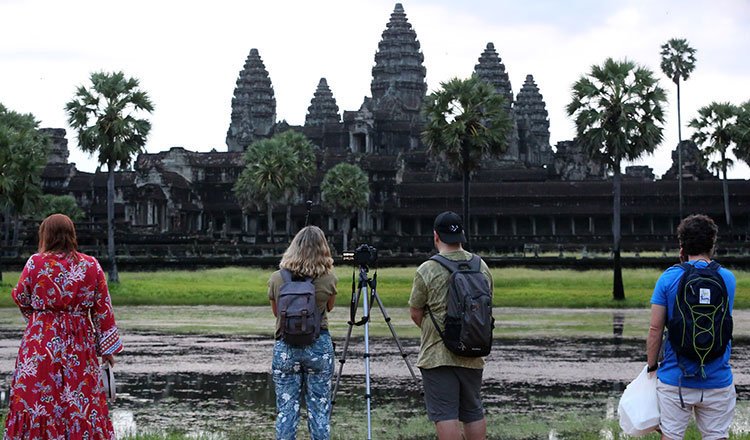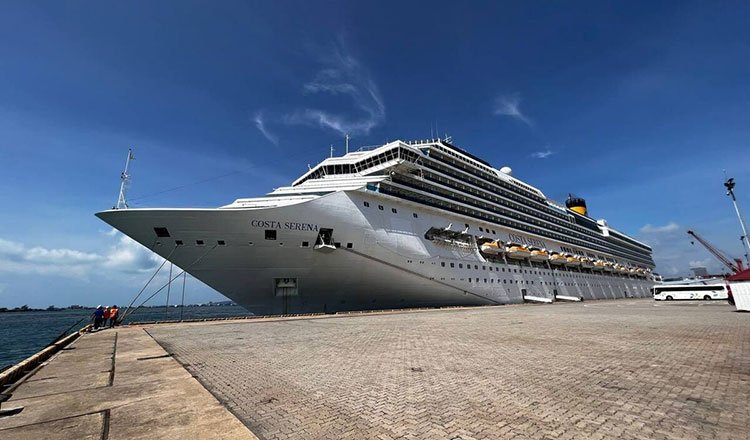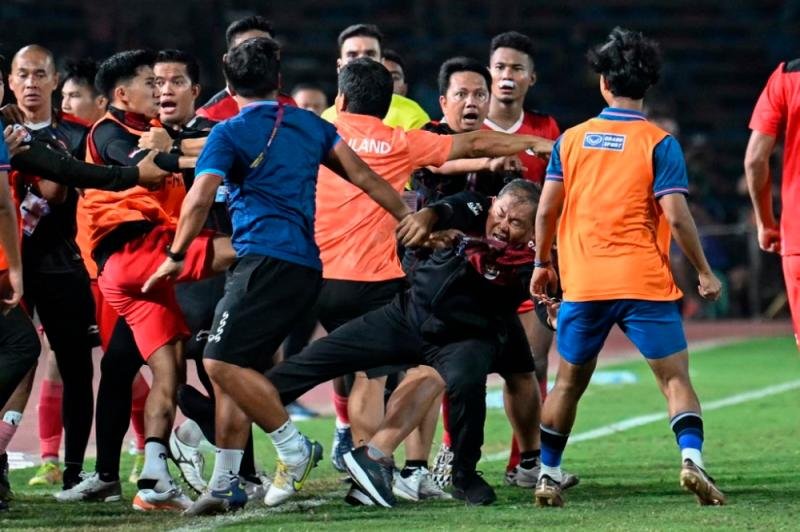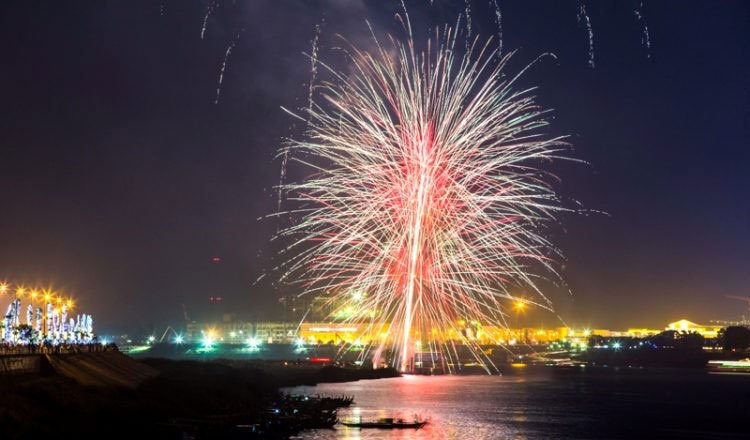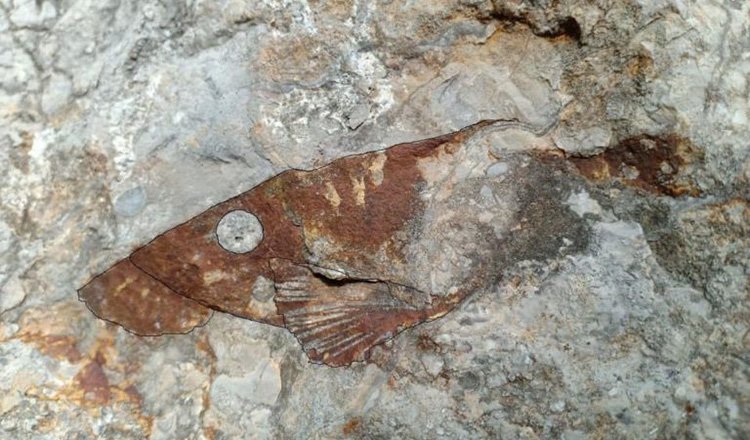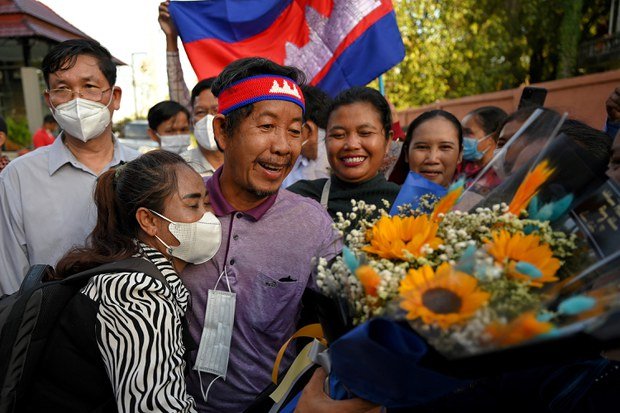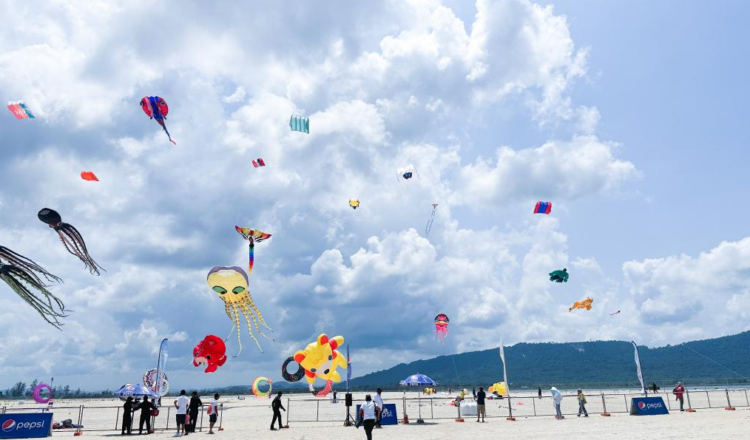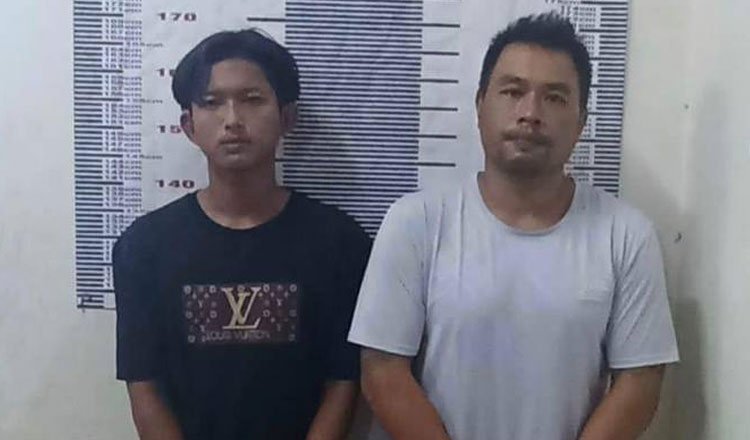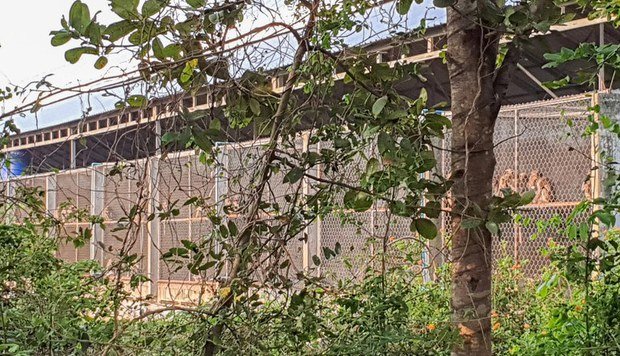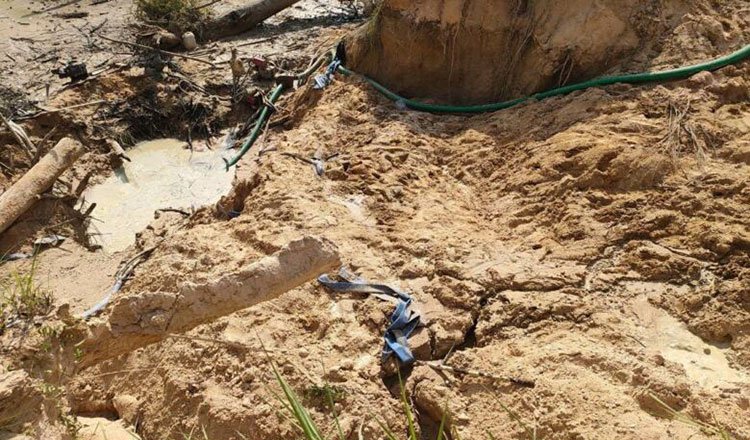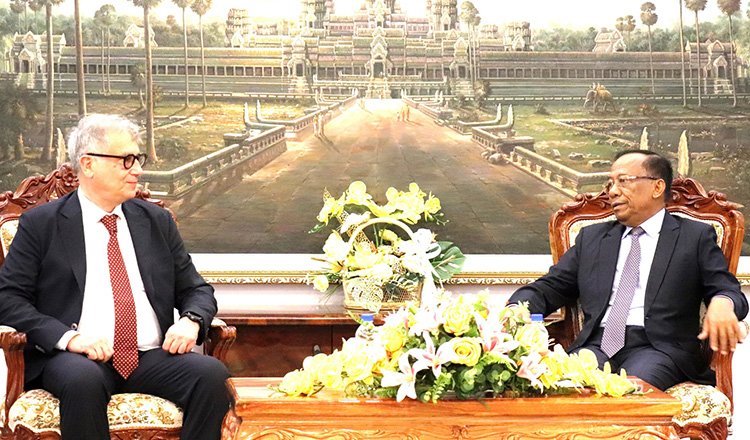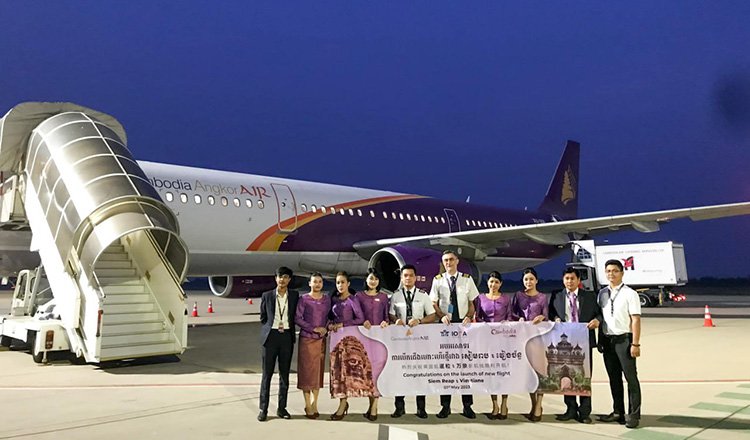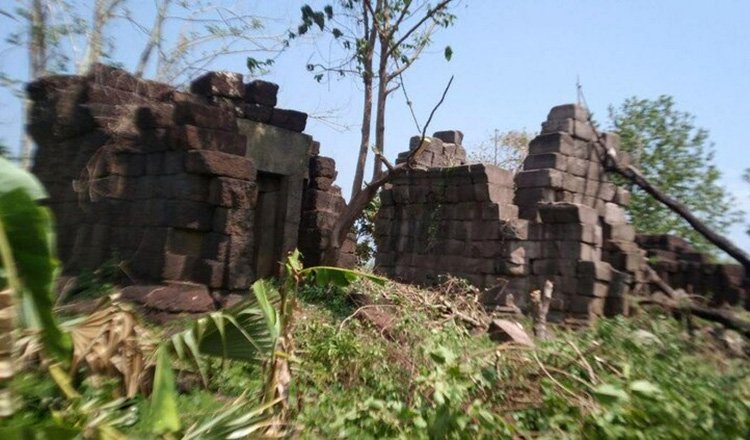-
Posts
15,793 -
Joined
-
Last visited
Content Type
Events
Forums
Downloads
Quizzes
Gallery
Blogs
Everything posted by geovalin
-

Calmette Hospital’s Polytechnic Centre Building inaugurated
geovalin posted a topic in Cambodia News
The newly-constructed Polytechnic Centre Building of the Calmette Hospital in Phnom Penh was put into official use this morning under the presidency of Prime Minister Hun Sen and First Lady First Lady Bun Rany Hun Sen. Equipped with high-tech medical equipment, the over-US$70-million new building was dubbed “Techo Aphivadh” (Techo Development). Speaking on the occasion, Hun Sen expressed his appreciation of the progress of the country’s health sector and re-appealed to medical practitioners to strengthen their professional ethics and their capacity building. According to Prof. Mam Bunheng, Minister of Health, stretching along Preah Monivong Boulevard, the “Techo Aphivadh” Building is 153 metres long and 22.5 metres wide. The 426-bed building has in total 12 floors and two-floor underground car parking. The building, whose construction started on Mar. 5, 2018 with financial support from the Royal Government, the Prime Minister and the First Lady, and charitable people under the slogan “Donate for Human Life”, is another major achievement of the Ministry of Health and Calmette Hospital toward the realisation of Cambodia’s Health Vision 2030, i.e. to “achieve the health system’s resilience and global health coverage that ensure a safe and healthy Cambodia,” he underlined. read more https://www.khmertimeskh.com/501296000/calmette-hospitals-polytechnic-centre-building-inaugurated/ -
He seemed to be referring to a top US diplomat’s 2021 visit to the home of a detained opposition leader. Prime Minister Hun Sen publicly lashed out at Western diplomats on Monday, saying they have insulted him in the past by visiting with detained opposition leader Kem Sokha. “In the future, don’t be arrogant again in the application of your foreign policy,” he said at the inauguration of a tire factory in Sihanoukville. “The diplomats in Phnom Penh should understand it,” the prime minister said. “It is because of you, you made me not trust you. Therefore, why should I do work that is in favor of you?” Kem Sokha was arrested in 2017 on treason charges. He was finally sentenced in March to 27 years in prison in a verdict widely condemned as politically motivated. It was unclear if any diplomats have visited Kem Sokha since the March verdict. Before his sentencing, ambassadors from Germany, France, the United Kingdom, Japan and the United States often met with him at his Phnom Penh home while he was under house arrest. U.S. Deputy Secretary of State Wendy Sherman went to see Kem Sokha during a June 2021 trip that included a meeting with Hun Sen. An angry prime minister later said that she secretly went to Kem Sokha’s home without informing the Minister of Foreign Affairs. U.S. Ambassador to Cambodia Patrick Murphy walks toward Phnom Penh Municipal Court during the court verdicts against Kem Sokha in Phnom Penh on March 3, 2023. Credit: Heng Sinith/AP ‘Foreigners who insult me’ On Monday, Hun Sen said he doesn’t “trust foreigners who insult me, insult my sovereignty, insult myself when they worked with me and at the same time worked with others.” He issued a similar public warning in April when he cautioned “Cambodia’s foreign friends” who support opposition party groups and politicians. “You have to choose between an individual group that breaks the laws and the government,” he said. “Please choose one. If you need those who were penalized by law, please do so, and you can then break diplomatic relations from Cambodia.” U.S. Embassy spokeswoman Stephanie Arzate told Radio Free Asia that the United States doesn’t “support any particular individual, institution, or political party” in Cambodia. But American officials “regularly meet with a wide range of individuals, in accordance with diplomatic norms and practices.” Kem Sokha has always denied the charges that led to his arrest, which took place months after the party he co-founded – the Cambodia National Rescue Party – had a strong showing in that year’s local commune elections. The arrest kicked off a broad government crackdown against civic activists and journalists. A similar crackdown has taken place in recent months against activists for the Candlelight Party, which has taken the CNRP’s place as the country’s main opposition party. Kem Sokha, former leader of the Cambodia National Rescue Party, greets supporters from a car in Phnom Penh on March 3, 2023. He was sentenced in March to 27 years in prison in a verdict widely condemned as politically motivated. Credit: Heng Sinith/AP ‘Just a political trick’ Last week, the National Election Committee ruled that the Candlelight Party couldn’t appear on the ballot for the July parliamentary elections, citing inadequate paperwork. Australia-based social development researcher Seng Sary said Hun Sen may have brought up the embassy visits to divert public attention ahead of the election and to show he is a strong politician who isn’t afraid to confront powerful countries. “This is just a political trick to draw support and to show power to the people and to the opposition leadership,” he said. Hun Sen also said on Monday there remains a possibility that Kem Sokha could be pardoned by King Norodom Sihamoni – but only if the prime minister chooses to make the request in writing to the king. Translated by Sok Ry Sum. Edited by Matt Reed and Malcolm Foster. https://www.rfa.org/english/news/cambodia/foreign-embassies-interference-05222023164609.html Copyright © 1998-2020, RFA. Used with the permission of Radio Free Asia, 2025 M St. NW, Suite 300, Washington DC 20036.
-
Cambodia attracted 1.29 million international visitors in the first quarter of 2023, an increase of 709 percent from only 159,546 over the same period last year, said a Ministry of Tourism’s report released on Tuesday. Thailand topped the chart among the international arrivals to the Southeast Asian nation during the January-March period this year, followed by Vietnam and China, the report said, adding that some 424,241 Thais, 207,527 Vietnamese, and 132,665 Chinese visited the kingdom during the period. Cambodian Tourism Minister Thong Khon said the kingdom is expected to attract more than 4 million international tourists this year after China optimized its anti-COVID-19 strategy and resumed its outbound group tours earlier this year. “China is one of the most important outbound tourism markets for the world, so China’s resumption of outbound tourism is very beneficial not only to Cambodia, but also to the whole world,” he told Xinhua. Tourism is one of the four sectors supporting the Cambodian economy. The country has three world heritage sites, namely Angkor archaeological park in north-western Siem Reap province, Preah Vihear Temple in north-western Preah Vihear province, and Sambor Prei Kuk archaeological site in central Kampong Thom province. Besides, Cambodia is known for its pristine coastline stretching in the length of 450 km in four south-western provinces of Sihanoukville, Kampot, Kep and Koh Kong. Xinhua https://english.news.cn/asiapacific/20230523/f5504511ee984e778d1c84ca21e279d8/c.html
-
More than 200 farmers descend on the capital to protest: ‘My son is not a dog,’ says one. A court in Cambodia’s Ratanakiri province has charged three men with incitement after they advised farmers of their constitutional rights, prompting more than 200 farmers to descend on the capital to call for their release. On the afternoon of May 17, authorities in Kratie province arrested Coalition of Cambodian Farmer Community President Theng Savoeun and 16 of his colleagues for “inciting social unrest” and “conspiracy to commit treason.” According to local rights group ADHOC, the arrests took place after the 17 met with farmers in Ratanakiri to discuss agricultural techniques and their rights as Cambodian citizens. That same day, police set 14 of the detainees free after they agreed to thumbprint a statement pledging that they would no longer conduct training sessions. The Ratanakiri Provincial Court formally charged Theng Savoeun and two others – Thach Hach and Nhel Pheap – and ordered them detained at the provincial prison. Nearly six days later, the trio remain in detention and have been refused access to lawyers or family members – visits they are guaranteed after 24 hours in custody, according to Cambodian law. Over the weekend, some 200 farmers – mostly women – from various provinces traveled to the Ministry of Interior in Phnom Penh to demand their release, claiming that they had provided assistance and done nothing illegal. ‘My son is not a dog’ Among them was Theng Savoeun’s mother, Toch Satt, who vowed that she will not leave the premises until her son is freed. “Minister of Interior Sar Kheng, I urge you to resolve this case – get it done today or I will not go home,” she shouted in front of the ministry on Monday, three days after joining other farmers in the capital to protest the detentions. “My son is not a dog, he is a human being,” she said. “I regret that you arrested my son, who did nothing wrong. My son serves the interests of the people.” Theng Savoeun, who is currently being detained, is the president of the Coalition of Cambodian Farmers Community, which was established in 2011 to help farmers' communities whose land was encroached. Credit: Theng Savoeun Facebook Other protesters – several of whom were carrying infants – held photos of the three detainees and cardboard signs calling for their freedom. One protester from Koh Kong province named Keut Neou told RFA Khmer that she and others had arrived in Phnom Penh to protest on May 19 and had since run out of money. She said they have been staying for free at a Buddhist temple in the suburbs, but are unable to afford rides downtown to the ministry. “We are poor people and farmers – we have no money, so we all decided to walk,” she said. Another farmer from Koh Kong named Nhel Sreymom urged Prime Minister Hun Sen and his wife, Bun Rany, to help find justice for the three detainees. “Please, Samdech father and mother, help find a solution for them,” she said, using an honorific for the prime minister. “These three people are innocent.” ‘Planning peasant revolution’ Ministry of Interior officials on Monday met with 10 farmers’ representatives and accepted a petition calling for their release. The officials said Hun Sen will examine and consider their demands. ADHOC human rights spokesperson Soeung Senkaruna urged the Ratanakiri court to reconsider the charges against Theng Savoeun, Thach Hach and Nhel Pheap. “If the charges still have reasonable doubt, the court should hold off on the charges because, from my view, Theng Savoeun has done a lot of work to help farmers to supplement the assistance of the government,” he said. Attempts by RFA to contact Ratanakiri Provincial Police Commissioner Ung Sopheap and Interior Ministry spokesman Khieu Sopheak about the case went unanswered Monday. However, Khieu Sopheak told local media group CamboJa on May 19 that Theng Savoeun and his associates were involved in “planning a peasant revolution.” About 200 farmers across the country protest in front of the Ministry of Interior to demand the release of Theng Savoeun, president of the Coalition of Cambodian Farmers Community and two of his associates who are being detained. Credit: Citizen journalist The Cambodian Farmers' Community Association has vehemently denied the allegations, saying it only instructed farmers on agricultural laws and techniques. The group, which claims to have a membership of around 20,000 people across Cambodia, was founded in 2011 to assist farmers from 10 communities who say their land was encroached on. ‘Crackdown’ on rights groups Local rights groups – including LICADHO, ADHOC and the Cambodian Center for the Defense of Human Rights – are monitoring the case and told RFA that the arrests not only threaten the Cambodian Farmers' Community Association, but also undermine the work of civil society. The case has also drawn the attention of international rights groups, including New York-based Human Rights Watch. Deputy Asia Director Phil Robertson said his organization was “appalled” by the arrests and violation of laws that allow the three access to lawyers, calling it an example of how authorities “blatantly violate basic freedoms of association and expression, and totally disregard Cambodia’s international human rights obligations.” Robertson also called authorities out for harassing supporters demanding the trio’s release, noting that police in Koh Kong stopped a minivan carrying Cambodian Farmers' Community Association members and prevented them from leaving the province. He linked the arrests to what he called a “crackdown” on NGOs and civil society groups in Cambodia ahead of the July 23 general election, “where any sort of challenge, real or perceived, to the government is met with a maximum display of intimidation and punishment.” “Cambodia should immediately and unconditionally let the CCFC 3 go free, and halt the campaign of harassment and abuse against the CCFC and other Cambodian NGOs who dare to stand up and exercise their civil and political rights,” Robertson said. Illegal land grabs by developers or individuals are not uncommon in Cambodia, where officials and bureaucrats can be bribed to provide bogus land titles. Disputes over land are one of the major causes of social disturbances throughout Southeast Asia. Translated by Sok Ry Sum and Samean Yun. Edited by Joshua Lipes and Malcolm Foster. https://www.rfa.org/english/news/cambodia/trio-05222023180221.html Copyright © 1998-2020, RFA. Used with the permission of Radio Free Asia, 2025 M St. NW, Suite 300, Washington DC 20036.
-
Cambodia’s economy is on a recovery path, with growth predicted to accelerate to 5.5 per cent in 2023, led by manufacturing exports, according to a World Bank report. In 2022, growth reached 5.2 per cent, returning to pre-COVID-19 levels, mainly due to a rebound in services, especially trade. Medium-term growth is expected to hit 6 per cent. Cambodia’s economy is firmly on a path to recovery, led by manufacturing exports and growth in other sectors, as per the World Bank. Post newly ratified trade agreements, economic growth is forecast to accelerate to 5.5 per cent in 2023. Cambodia’s economic recovery solidified in 2022, when real growth accelerated to 5.2 per cent. A strong rebound in services, especially trade has helped bring Cambodia back to pre-COVID-19 growth levels. This revival is also boosted by easing domestic prices as global oil and food prices stabilise, according to the ‘Cambodia Economic Update: Post -COVID-19 Economic Recovery’ by the World Bank. read more https://www.khmertimeskh.com/501293706/world-bank-says-cambodia-needs-to-diversify-its-tourism-products-and-improve-its-trade-competitiveness/
-
Costa Serena, a cruise ship sailing under the flag of Italy, has been on a two-day visit in Cambodia. Coming from Thailand, the cruise ship with 1,671 tourists of 37 different nationalities on board docked at Sihanoukville Autonomous Port, Preah Sihanouk province on May 17. According to the Preah Sihanouk Provincial Department of Tourism, most of the tourists are Thai and Chinese. The cruise ship of 290.20 meters long and 35.50 meters wide left Preah Sihanouk province and returned to Thailand on May 18, at around noon. The docking of Costa Serena shows that Cambodia with a good control of the COVID-19 pandemic is a safe country to visit. The Royal Government’s right policy to boost the COVID-19 vaccination is seeing success as Cambodia was able to reopen the country and resume its socio-economic activities since November 2021. Phal Sophanith – AKP https://www.khmertimeskh.com/501293733/italian-flagged-cruise-ship-with-nearly-1700-multinational-tourists-make-port-call-at-sihanoukville/
-
JAKARTA, May 19 (Reuters) - Prominent Cambodian opposition figure Sam Rainsy on Friday denounced elections in July as a farce after the sole opposition party was disqualified, and derided long-ruling Prime Minister Hun Sen's plan for his son to succeed him in power. "Now even the facade of democracy has collapsed in Cambodia," Sam Rainsy told Reuters on the sidelines of an event on electoral and press freedom in Jakarta. Sam Rainsy, the co-founder of another banned political party, has been living in self-exile and has been convicted of multiple offences in absentia, including in March last year when a court found him guilty of a plot to overthrow the government. read more https://www.reuters.com/world/asia-pacific/cambodia-opposition-figure-calls-upcoming-election-sham-2023-05-19/
-
But spending millions while offering free housing and food to athletes prompts some complaints. The splashy sporting extravaganza drawing to a close in Phnom Penh on Wednesday featured 12,000 participants from 11 nations and included free tickets, free food and free accommodations – and also helped Prime Minister Hun Sen shine on an international stage just before a national election. The Southeast Asia Games, hosted by Cambodia for the first time, featured a US$150 million stadium built by China specifically for the event. And on the first day, Hun Sen presided over an elaborate opening ceremony stage-managed by Chinese technicians. King Norodom Sihamoni, Cambodia’s constitutional monarch and head of state, did not attend. The stage and light show highlighted the prime minister’s achievements since he took power in 1985 and portrayed him as a national unifier after the dark years of civil war and Khmer Rouge rule. But the cost of the event has prompted some grumbling in Cambodia, where the economy continues to lag after the COVID pandemic. Performers are seen at the opening ceremony – managed by Chinese technicians – for the Southeast Asia Games at Morodok Techo National Stadium in Phnom Penh, Cambodia, May 5, 2023. Credit: Reuters Youth activist Kim Chilin was proud that Cambodia could host a big regional event, but questioned the decision to cover the costs for everything, and the way Hun Sen exploited the event to boost his reputation. “The ruling party is using this event to promote themselves and for political gain,” he said. “You cannot claim for your own credit or say that it came from the ‘big heart’ of the prime minister.” ‘Grab the attention of the public’ Cambodia picked up the US$7 million cost of hosting and feeding athletes from visiting nations by waiving the daily US$50 per person that is normally charged to each sports delegation. Hun Sen said he did that to bring in more competitors for the games, which included 584 events across 37 sports. “I am not hostile to the money, but the fact that we didn’t take this money was to attract more foreigners to visit and know about Cambodia,” he said in a speech in Sihanoukville on April 30. “If we took that money, we still couldn’t become rich.” About 5,000 sports delegates stayed at a newly constructed “Sports Village,” while another 2,000 stayed at four-star hotels near the stadium. Malaysia’s Muhammad Hafizul Adnan [right] vies for the ball against Cambodia’s Phom Kongkia during their sepaktakraw team regu match at the Southeast Asian Games in Phnom Penh, Cambodia, on May 12, 2023. Credit: AFP Just before the games began, the prime minister mandated that all Cambodia television channels show the events. “Wake up all TV stations! Please broadcast the SEA Games events!” he said. “Public and private TV stations must broadcast the SEA Games to bring nationwide excitement!” He also ordered free entrance tickets for local and foreign spectators and granted free broadcasting rights for local and foreign media. “These were all crazy ideas,” Finland-based political analyst Kim Sok said. The US$7 million spent on the visiting athletes is normally picked up by the competitors’ home countries, he said. “But we didn’t ask that from them,” he said. “I don’t know why he doesn’t take that money? We could take it and spend half of it to develop our sports and use the other half as a prize for our athletes.” Thailand’s Chayanisa Chomchuendee competes in the women’s pole vault final during the Southeast Asian Games in Phnom Penh, Cambodia, on May 10, 2023. Credit: AFP For Heng Kimsour, a university student in Phnom Penh, the games have been exciting and a source of pride for a country that has waited more than six decades to host the regional Olympiad. “We have shown our rich culture and civilization to the world,” she said. “Nevertheless, Cambodia has spent millions of dollars to organize this event while we are still a developing country,” she said. “It seems like the government hosts the free SEA Games to grab the attention of the public so that they forget about politics and the election, as well as the illegal privatization of natural resources.” China’s involvement The new 60,000-seat national stadium was originally announced as a gift from China to Cambodia, but its name – “Morodok Techo” – means “Hun Sen’s Inheritance.” Hun Sen admitted that his government couldn’t have hosted the games without China, and he publicly thanked Chinese President Xi Jingping during a speech in Phnom Penh on May 1. “Other ASEAN countries have already hosted the SEA Games; why didn’t Cambodia do it?” he said. “I told the ASEAN counterparts to understand that I needed money to build infrastructure, accelerate social and economic development and reduce poverty. We needed roads, bridges, irrigation systems, schools, hospitals. We needed money to build them up.” Once the Chinese began building the stadium in 2013, Hun Sen told Minister of Tourism Thong Khon to prepare to host the games, he said. China also helped with the May 5 opening ceremony. At the end of January, a team of nearly 100 people arrived in Cambodia to start working and rehearsing, Chinese director Chen Wei Tan told China Radio International. The technical team was divided into directing, acting, lighting, sound and musical composition. Lights and LCD screens were also brought from China, Chen said. Fireworks light the night during the opening ceremony of the Southeast Asian Games at Morodok Techo National Stadium – built by China specifically for the games – in Phnom Penh, Cambodia, on May 5, 2023. Credit: AFP “The Cambodian government needed help from China to organize the great opening ceremony and create a new image to the world,” he said. “We use our wisdom and power so that Cambodia and China can build up ‘a Community of Common Destiny’ with high quality and standards.” “Community of Common Destiny” is a phrase from a 2017 speech by Xi Jinping often used in Chinese foreign policy to promote mutual cooperation with neighboring countries. Television commentators were heard using another slogan that is also often used in Chinese foreign policy: “Win-win.” During the opening ceremony broadcast, the announcers praised the prime minister and spoke of his time in power as the “Techo” era. “Techo,” which means powerful or strong, and references an ancient Khmer warrior, is one of Hun Sen’s leadership honorifics. “The win-win policy of the extraordinary founder and leader in the Techo-era fully and genuinely ended the civil war, bringing peace and full national unity, paving the way for a prosperous future and confidence and giving each and every Cambodian citizen the rights to hope, freedom and (a) warm smile,” the ceremony’s narrator said. “Thanks for a win-win policy!” Translated by Yang Chandara. Edited by Matt Reed and Malcolm Foster. https://www.rfa.org/english/news/cambodia/hun-sen-sea-games-05162023163556.html Copyright © 1998-2020, RFA. Used with the permission of Radio Free Asia, 2025 M St. NW, Suite 300, Washington DC 20036.
-
Cambodia’s digital government has remarkably improved as it jumped 31 ranks to 127 among 194 countries in the world in the last seven years from 2016 to 2022, the telecommunications ministry said on Tuesday quoting a senior official of the United Nations Department of Economic and Social Affairs (UNDESA). The upgraded rank of Cambodia’s digital government was revealed during an opening session of a workshop on capacity building and input collection for the preparation of a national data governance framework in Hyatt Regency Phnom Penh presided over by Chea Vandeth, Minister of Posts and Telecommunications (MPTC) and attended by government officials. The event that was also attended by officials from ministries and institutions of the government, private sector, education institutions, non-governmental organisations (NGOs) and other relevant bodies, the UNDESA’s representative appraised Cambodia’s quantum leap in the digital sector to the participants. read more https://www.khmertimeskh.com/501292283/cambodia-jumps-31-ranks-in-e-govt-development-index/
-
PHNOM PENH, May 17 (Reuters) - Thai football chiefs apologised on Wednesday and promised "severe punishments" for wrongdoers after brawls marred the South East Asia Games soccer final against Indonesia in Cambodia. Indonesia won the under-23 match 5-2 on Tuesday after extra time, by which time Thailand had been reduced to eight players and the Indonesians to 10 in the wake of four red cards and two all-in brawls. The Thailand Football Association said the incidents at Phnom Penh's Olympic Stadium had damaged the image of the national team and singled out the involvement of their coaching staff for particular criticism. read more https://www.reuters.com/sports/soccer/thai-fa-apologises-sea-games-final-brawls-2023-05-17/
-
- 2
-

-
Decision appears to pave the way for Hun Sen’s party to keep grip on power. Cambodia’s main opposition Candlelight Party was officially rejected by the National Election Committee on Monday and won’t be allowed to compete in the July 23 parliamentary elections. The decision deals an enormous blow to opponents of Hun Sen’s ruling Cambodian People’s Party, which now looks like it will sail to an overwhelming victory in the vote. It also repeats what happened before the last election, in 2018, when the Supreme Court dissolved the previous main opposition Cambodia National Rescue Party, or CNRP, which was perceived as a threat to Hun Sen’s decades-long grip on power. The ruling CPP went on to win all 125 seats in the assembly. The election committee’s decision wasn’t surprising, and it came down to an apparent problem with paperwork. The Candlelight Party had submitted its application to register for the election, but the committee warned last week that it wouldn’t accept a statement from the Interior Ministry confirming the party’s registration in 1998. It said it required the original certificate issued by the ministry, which was lost in 2017, when the CNRP offices were raided by government agents. On top of that, the committee needs that document certified by the Phnom Penh Municipality. Candlelight Party members cried foul because the party was allowed to compete in previous local elections. “Some problems are politically motivated, and that makes it a bit difficult for our country,” Candlelight Party spokesman Kim Sour Phirith told Radio Free Asia. “Legally, we have documents certified by the Ministry of Interior, which is good enough for us to be able to participate in the coming election because we, the Candlelight Party, were already allowed to join last year’s commune election and then the recent city/provincial/district election,” he said. “So we don’t know what else to do,” he said. Appeals The party has five days to file a complaint with the Constitutional Council, a judicial body that examines election disputes. Candlelight officials have also tried to meet with Hun Sen to seek his intervention, but he wouldn’t agree to meet until after the election, Kim Sour Phirith said. “The Cambodian government is clearly fishing for any excuse to block opposition parties from competing,” said former Thai minister of foreign affairs Kasit Piromya. “Disqualifying a party on the basis of such a small technicality fools absolutely no one and just serves as another show of the Hun Sen regime’s bad faith dealings,” he said in a statement issued by the Asean Parliamentarians for Human Rights group. U.S. Embassy spokeswoman Stephanie Arzate said the NEC’s decision “undermines Cambodia’s democracy,” and she urged authorities “to reopen political and civic space, including ending harassment of opposition parties.” Exiled opposition figure Sam Rainsy said opposition parties that emphasized democratic values won seats in Phnom Penh in the 2003 and 2013 parliamentary elections – and Hun Sen was probably worried that Candlelight Party candidates on the ballot from Phnom Penh would also perform well. “The big thing is that Hun Sen wants to transfer power to his son, Hun Manet, to become prime minister after the election,” he told RFA. “And Hun Manet is standing as first candidate for election in Phnom Penh.” The Candlelight Party has attracted support with a policy platform centered around improving social welfare benefits such as offering free check-ups and treatment at public hospitals and raising the minimum monthly wage for garment workers and civil servants. The election committee should explain why it recognized and allowed the Candlelight Party to participate in two recent elections, but not this one, said Kang Savang, a coordinator with the independent Committee for Free and Fair Elections in Cambodia (Comfrel). “Why does the NEC not accept the Ministry of Interior’s declared recognition of the CLP?” he asked. “This seemingly means that the NEC does not acknowledge the legal existence of the Ministry of Interior.” The party’s registration for last year’s commune elections and the recent city and provincial elections seemed to go smoothly, legal scholar Vorn Chanloth said. “So, I think we should keep using that procedure,” he said. “Any new procedure should be flexible too. That means that if a political party isn’t able to fulfill the new requirement, it should be allowed to follow the old workable procedure.” Translated by Sok Ry Sum. Edited by Matt Reed and Malcolm Foster. https://www.rfa.org/english/news/cambodia/candlelight-election-commitee-05152023174027.html
-
Fireworks were fired into the sky over the Tonle Sap River in front of Cambodia’s Royal Palace in the capital Sunday night to mark the 70th birthday of Cambodian King Norodom Sihamoni. The colourful and eye-catching fireworks were on display for about 20 minutes. Congratulatory messages from the leaders of the Senate, the National Assembly, and the government ministries have been read on television channels and radios, published on newspapers and posted on online media. “On this great occasion, I would like to wish Your Majesty the King good health, strength, and longevity in order to stay as cool shade for the people of Cambodia,” Prime Minister Hun Sen said in a congratulatory message to the monarch. As in previous years, the King did not host any lavish celebrations on his birthday, but attended a Buddhist ceremony held at the Royal Palace. King Norodom Sihamoni was born on May 14, 1953. He was inaugurated and formally anointed as the King of Cambodia on Oct. 29, 2004 after his father the late King Norodom Sihanouk abdicated for health reasons https://english.news.cn/asiapacific/20230514/47ee82ca31524eaab4c51436ebdc91ad/c.html
-
Ten former Cambodia National Rescue Party (CNRP) activists have been released from prison after releasing a video clip and sending a handwritten apology to Prime Minister Hun Sen in early May. On May 6, Kong Mas and nine other former CNRP activists wrote a letter to the Premier requesting their release from jail. Mas’s letters stated that after serving five years in prison, he realised his guilt and recognised that he had been conned by the opposition leader’s propaganda at the time. The ten activists added that they regretted being engaged in the ‘ideological actions’ of the CNRP leader and asked for Mr Hun Sen to assist in obtaining a pardon and release them on bail. The activists were jailed for conspiracy to incite social unrest and support the return of former CNRP President Sam Rainsy to Cambodia in 2019. The opposition activists are Mas, Vorn Savann, Thuy Vy, Chhun Bunchat, U Rim, Chan Sarath, Nop Von, Peng Sokha, Vorn Leng and San Saury. On May 6, Mas, a former CNRP member in Svay Rieng province, was pardoned by a royal decree, but nine other members have not yet been pardoned. read more https://www.khmertimeskh.com/501290267/former-cnrp-activists-released-from-prison-after-apologising-to-pm/
-
PHNOM PENH: Everyone in Phnom Penh, it seems, wants a selfie with Bou Samnang. The Cambodian runner has become a star of the Southeast Asian (SEA) Games since her gritty performance in the 5,000m event. Although she came last, her determination to finish the race under torrential rain charmed the country and even won plaudits from Prime Minister Hun Sen. Videos of her crying after crossing the line have gone viral. "I can say now I'm famous," the 20-year-old said at the Morodok Techo Stadium, the scene of her unlikely rise to prominence, where passers-by were lining up for photos with her. "Although I lost, they support me from the bottom of their hearts." This week's race was not the first time Bou Samnang has had to show determination, but is the latest step on an athletics journey that started on ill-equipped dirt tracks and has defied health problems and bereavement. "I knew I was losing. The rain was so heavy," said the Phnom Penh native, whose mother is a housewife and whose father died in an accident a few years ago. read more https://www.channelnewsasia.com/sport/cambodia-sea-games-runner-bou-samnang-3486461
-
Heritage experts at the Ministry of Environment said in an online lecture yesterday that they had unearthed fossils of marine flora and fauna in Ratanakiri, Mondulkiri, Stung Treng, Battambang, Oddar Meanchey, Banteay Meanchey and Preah Vihear provinces. Archaeologist Lim Vanchan, director of the Cultural Heritage Office of the Ministry of Environment’s Department of Heritage, said the fossils provide information about life forms and their way of life. He said the study of fossils, or paleontology, is closely related to other scientific areas such as archaeology, biology and geology. However, Cambodia has only limited experience in this scientific area with the Ministry of Environment starting to research fossils in 2019. Prior to the official start of the search for fossils, a research team led by Vanchan discovered fossils of sea shells in Koh Tay in Preah Vihear province in 2017. The Ministry of Environment has since officially launched the paleontology programme with government support. read more https://www.khmertimeskh.com/501287424/marine-plant-fossils-discovered-across-cambodia/
-
Candlelight Party’s Rong Chhun would have gone head-to-head with Prime Minister Hun Sen. Cambodia’s election committee on Tuesday rejected a top candidate from the country’s main opposition party and said the party must correct several things before its candidates can be allowed to run in the July 23 parliamentary elections. The decision comes a day after Monday’s deadline for parties to submit applications to participate in the vote that Prime Minister Hun Sen’s ruling Cambodian People’s Party is widely expected to win. The CPP already controls all 125 seats in the National Assembly – a stranglehold that the opposition Candlelight Party hopes to crack at least a bit. But authorities are making it difficult for the Candlelight Party to run for the election. The National Election Committee has not approved its application to field candidates in July. On Tuesday, Rong Chhun, the party’s vice president and a prominent labor activist who joined the Candlelight Party in January, was barred from being listed as the party’s top candidate in Kandal province due to a prior conviction, said the committee’s secretary general, Tep Nytha. In August 2021, Rong Chhun was sentenced to two years in prison for criticizing the government’s failure to address disputes over Cambodia’s shared border with Vietnam. He was later ordered to serve for 15 months, with the remainder of the sentence suspended with a three-year probation. “He was convicted and has not been rehabilitated,” Tep Nytha wrote in a statement. Versus Hun Sen Rong Chhun would have been on the ballot opposite Hun Sen, who is running as the CPP’s top candidate in Kandal, which surrounds the capital of Phnom Penh. Rong Chhun said he was allowed to vote in last year’s commune elections. If that wasn’t a probation violation, then running as a candidate this year also shouldn’t be a problem, he told Radio Free Asia. The party will have no option but to remove him from its candidate list, said spokesman Kim Sour Phirith. “It is sad that the NEC won’t allow him to run,” he said. “Election law says Rong Chhun can run, but this was just an excuse.” The Candlelight Party submitted its application to the election commission on Saturday after the Ministry of Interior issued a statement recognizing the party. The party had lost its original statement from the ministry during a 2017 raid on the offices of the Cambodia National Rescue Party, which at the time was the country’s leading opposition party before it was shut down by the Supreme Court. The party had received 44 percent of the votes in the 2013 general election, but was unable to run in the 2018 elections. The election commission still needs a copy of the Ministry of Interior's statement and has asked that the party also provide a copy of the receipt showing it paid 15 million riel (about US$3,600) to register. Another key opposition figure, Sam Rainsy, who lives in self-imposed exile in France, urged the international community not to recognize the results of the July 23 election, which he said would be a sham. This year’s election is “shaping up along the usual lines” compared to 2018, the Sam Rainsy wrote in an op-ed for Nikkei Asia on Tuesday. “There will not be any surprises when the votes are counted,” he wrote. “The presence of a small symbolic opposition allows Hun Sen to present a facade of democracy to dampen international criticism.” Translated by Samean Yun. Edited by Matt Reed and Malcolm Foster. https://www.rfa.org/english/news/cambodia/candlelight-candidate-ballot-05092023133447.html Copyright © 1998-2020, RFA. Used with the permission of Radio Free Asia, 2025 M St. NW, Suite 300, Washington DC 20036.
-
Cambodia has hosted its first international kite flying festival “SkyFest” in the southwester coastal city of Sihanoukville, aiming to preserve traditional culture and inspire the younger generation to pursue their dreams. Under the slogan of “Khmers can fly”, the event held on Saturday was presided over by senior minister Ly Thuch, first vice president of the Cambodian Mine Action and Victim Assistance Authority (CMAA). Thuch said the Southeast Asian country was honoured to host kite enthusiasts from nine different countries, saying that each had brought their unique talents and contributions to this extraordinary event. “SkyFest is not only a celebration of our cultural heritage but also an opportunity to learn from each other and build lasting relationships,” he told Xinhua on Sunday. “The theme ‘Khmers Can Fly’ reflects not only the grace of our kites soaring high above us but also the aspirations and dreams of the Cambodian people as we continue to make strides towards a brighter future,” Thuch said. read more https://www.khmertimeskh.com/501286340/cambodia-organizes-intl-kite-flying-festival-in-coastal-city/
-
The Criminal Police Department of the Ministry of Interior on Saturday afternoon, May 6, 2023, presented two suspects in public They were wanted in connection with a brutal attack with a handgun and a sharp knife on New Zealander Geoffrey Brent McComb on April 29, 2023 at the village of Kbal Damrey, Mak Prang commune Teuk Chhouk district, Kampot province. The attack took place on April 29, 2023, at 22:20. The victim had visited Kampot City with his girlfriend and then went home. A group of suspects locked the victim’s house and entered the house to demand money, but the victim refused to pay and argued. At that time, the suspects pulled out a pistol and shot the victim in the thigh, and then fled On May 4, 2023, at 14:12, the Criminal Police Department, in cooperation with the Battambang Provincial Police, Pursat Provincial Police and Kampot Provincial Police, arrested two suspects. read more https://www.khmertimeskh.com/501285880/2-arrested-for-attempted-murder-of-new-zealander/
-

Damning evidence emerges in Cambodian monkey smuggling case
geovalin posted a topic in Cambodia News
Footage showing a senior Cambodian official communicating with smugglers is part of U.S. case against him Hidden camera footage has emerged showing what U.S. prosecutors say is clear involvement by a senior Cambodian official in running a research monkey smuggling operation. In the video, whose existence was first reported by RFA last year, former Cambodian Department of Wildlife and Biodiversity head Kry Masphal is seen facilitating an illicit drop-off of long-tailed macaques at a breeding facility in northern Cambodia, even offering advice on how to move the endangered species more efficiently. “Why don’t you make another road?” Kry is seen asking a worker. “If you make another road, this means [it’s] more safe for your smuggling.” The footage was filmed in 2019 by a confidential informant for U.S. investigators and submitted by prosecutors as evidence against Kry in a high-profile U.S. government smuggling case against him and other conspirators. It was obtained from the court by animal rights group PETA, which shared it with RFA. In aviator sunglasses and a buttoned-down blue checkered shirt, Kry carries himself in the video with a swagger a world apart from the nervous figure who sat in a Miami court two weeks ago listening to his lawyers fight to exclude the contents of his mobile phone from his upcoming trial. Kry was director of Wildlife and Biodiversity in Cambodia’s Forestry Administration at the time of his arrest at New York’s JFK airport in November 2022, where he was transiting on his way to a conference in Panama on the protection of endangered species. He has been charged with being party to a plot to launder wild-caught long-tailed macaques - a primate prized for medical research - from the jungles of Cambodia and Thailand into U.S. research laboratories. In part to conserve dwindling wild populations, but also to preserve the integrity of scientific findings, only captive-bred monkeys can be used in medical experiments. Also accused are Kry’s boss, Forestry Administration Director General Keo Omaliss and six individuals involved in the management of the Chinese-owned Vanny Group’s monkey farms in Cambodia. Kry has pleaded not guilty, while the Cambodian Ministry of Agriculture, which oversees the Forestry Administration, and the Vanny Group have both denied any improper activity took place. However, the video that has emerged among a mountainous pile of evidence against Kry contains damning proof of his involvement and acknowledges the illegal nature of the operation. Kry is seen helping to offload crates of monkeys from the back of a pickup truck at what prosecutors say is Vanny Group’s monkey farm in Pursat province. The person working with him asks how many monkeys Kry has brought with him “this time.” “Twenty-four,” Kry replies. “We cannot take more because many observers, we have to do [it] very quick and go very fast.” In a last-ditch attempt to avoid a trial, Kry’s lawyers – whose firm has been a registered lobbyist for the Cambodian government since January 2022 – have pushed for the case to be dismissed on the grounds that he was acting on orders from his government. For conservationists, the stratagem was a confirmation of their worst fears: that the poaching and laundering of wild-caught macaques from Cambodia was not the behavior of a few rotten apples but the de facto policy of the government. “This means that there is no safe, legitimate and legal supply of monkeys,” Lisa Jones-Engel, a primatologist with PETA, told RFA. “When you have somebody like Kry involved, working so out in the open, saying, ‘This is great for our smuggling.’ From a government official who signs on the dotted line?” “Kry is just another run-of-the-mill monkey juggler, there was nothing that distinguished him from every other person on that video,” she added. An RFA investigation last month showed the deep penetration of the primate industry into Cambodia’s ruling elite, from the immediate family of Prime Minister Hun Sen down through the relevant regulatory and enforcement bodies that are supposed to be policing the trade. Agriculture Minister Dith Tina did not immediately respond to a request for comment on why a public official might need to hide their activities from observers. Vanny has denied the U.S. prosecutors’ central allegation that wild monkeys were laundered through its farm and passed off as captive bred ones for export. However, in conversation with RFA earlier this year an employee at the farm said that in 2022 the practice became almost routine as demand, amped up by spiking prices, vastly outstripped legitimate supply. “There weren’t enough monkeys before because demand was so high, so we bought them from a nearby mountain,” the person said, not wanting to be identified for fear of retaliation. “If they had good eyes, a good body, good fur, then we exported them,” they added. “We have a lab to weigh them and do blood tests to see if they have diseases or not.” The unsealing of the indictment against Kry, Keo and Vanny’s management last November halted exports from the farm, the employee said. Prior to that, they added, the farm’s outbound shipments in 2022 regularly included between 100 and 200 “mountain monkeys,” in clear violation of international laws and regulations governing trade in the species. The employee was insistent that this was something that only took place in 2022. However, the U.S. prosecutors’ case alleges illicit activity to have taken place between December 2017 and January 2022. Kry’s case is due to go to trial in Miami in June. Edited by Boer Deng. https://www.rfa.org/english/news/cambodia/cambodia-monkey-05052023165359.html Copyright © 1998-2020, RFA. Used with the permission of Radio Free Asia, 2025 M St. NW, Suite 300, Washington DC 20036. -
Phnom Penh, Cambodia — Cambodia kicked off its first-ever hosting of the Southeast Asian Games on Friday, in a historical ballyhoo of singing, dancing, flag-waving and fireworks. The evening's festivities welcomed athletes from across the region to the biennial multi-sport event while trumpeting the country's rich history and thanking its long-ruling leader for recent modernization. Prime Minister Hun Sen's ruling Cambodian People's Party is keen to build excitement and patriotic fervor around the SEA Games, with a successful event and medals haul likely to boost national sentiment two months ahead of parliamentary elections, which the CPP will almost certainly win. "For me, this event is very wonderful. We have been waiting for this for 64 years," said Seng Meng Hong, a 24-year-old attendee. The SEA Games were first held in Bangkok in 1959. "I'm so happy that the government could organize such an event so the Cambodian people can come and support the national athletes," Meng Hong added. Tickets to the Games have been given away for free — and demand has been high. Inside the Morodok Techo National Stadium on Friday, a clear and balmy evening, all of the venue's 60,000 seats were packed. Cambodian dancers perform during the opening ceremony of the 32nd Southeast Asian Games in Morodok Techo National Stadium outside Phnom Penh, Cambodia, May 5, 2023. Built and paid for by China, the stadium looms over the open, wooded parts of Phnom Penh's far outskirts like a crash-landed spaceship. But its two dramatically cresting pylons also evoke the keel and stern of Chinese trading junks that plied the capital city's waterways hundreds of years ago. Almost all in attendance wafted themselves with handheld fans or brandished Cambodian flags — when not participating in an impeccably observed stadium wave. All stood for the national anthem when soldiers in ceremonial uniform performed a flag-raising ceremony. The main production — a riot of golden finery, elegant costumes and spear-toting warriors — told the story of the kingdom, from its founding myths through the Angkor period. Athletes demonstrated Kun Bokator, the national martial art making its debut at this year's Games. Skipping ahead to mention a bleaker period, a speaker noted only the end of "the dark era of the genocidal Pol Pot" in 1978 and thanked Cambodian leaders since then for "prosperity and peace." The most senior of those leaders were in attendance. Cambodian Prime Minister Hun Sen, center right, waves to the crowd as he presides over the opening ceremony of the 32nd Southeast Asian Games in Morodok Techo National Stadium outside Phnom Penh Cambodia, May 5, 2023. Along with dignitaries including the prime minister of Vietnam and the president of Laos, Hun Sen entered the stadium to great applause. The prime minister spoke briefly, expressing his gratitude for peace in the country under his leadership and declaring the opening of the Games. Critics say Hun Sen, one of the world's longest-ruling leaders, has wound back democratic freedoms in the country as he prepares for the general election in July and has used the courts to stifle opposition. Several events of the SEA Games have already been played, and the hosts are top of the medals table for now with five golds. Events kick into full gear Saturday, with the Games running to May 17, before the Para Games in early June. https://www.voanews.com/a/flags-fireworks-as-cambodia-kicks-off-sea-games-/7081009.html
-
PHNOM PENH, Cambodia (AP) — Four Cambodian prospectors who were digging for gold in the central province of Kampong Thom were killed when earth collapsed into the pit where they were mining, a government official and a fellow villager said Friday. Information Minister Khieu Kanharith on his Facebook page quoted reports from a local official saying the four men who died had been hired by a couple who own the mine in the rural jungle village of Snong An. The accident occurred Thursday morning as the men were digging, said Ven Srey Tith, a villager living near the site. Speaking by phone from her home, she said the pit was only a little more than two meters (six feet) deep, but mounds of excavated earth collapsed into it without warning and no one was nearby to see the men’s plight. read more https://apnews.com/article/cambodia-gold-mine-accident-c25f8683bf851ce7c3d36e6ab3d55291
-
Cambodia has agreed to resume international adoptions between Italy after the two countries temporarily suspended the process due to legal and technical issues. The agreement came after Minister of Social Affairs, Veterans and Youth Rehabilitation Vong Sauth met with Vincenzo Starita, Vice-President of Italy’s Commission for Intercountry Adoptions, at the ministry on Wednesday. After the law was drafted, the government announced the resumption of the adoption process, but it was interrupted due to the spread of COVID-19 in Cambodia, as well as in Italy and other countries, Sauth said. “Italy has provided training on adoption procedures, legal training to protect victims and other relevant rights to ensure that adoption is in line with international law to avoid trafficking,” he said. In addition to training and coaching, the Italian side also has its own agency to conduct adoptions and to cooperate with the relevant ministries and institutions to re-commence the adoption procedure, the minister added. Sauth also urged relevant institutions and officials to continue to share and exchange ideas with each other. read more https://www.khmertimeskh.com/501284813/cambodia-agrees-to-resume-child-adoptions-with-italy/
-
Dissidents typically try to paint Hun Sen as unpatriotic, expert says Prime Minister Hun Sen has announced that he – and not Cambodia’s king – would preside over Friday’s opening ceremony of the Southeast Asian Games, provoking criticism from exiled dissidents who say he is disrespecting the monarchy. Cambodia is hosting the Southeast Asian region's premier sporting event for the first time. The May 5-17 games will include 11 nations in the region competing in 36 events, and the country has built a new Chinese-funded 60,000 seat stadium for the occasion. In host countries, including monarchies, the sitting head of state is usually given the honor of declaring the start of the games at the opening ceremony. Though King Norodom Sihamoni is the official head of state in Cambodia, he rarely exercises his limited powers granted by the constitution and tries to avoid getting involved in politics. Hun Sen, 70, has ruled Cambodia since 1985, and is believed to be manipulating the government and the country’s laws in an attempt to pass his role as leader to his son Hun Manet before retiring. The country is scheduled to hold national elections in July that the ruling Cambodian People’s Party is widely expected to win. At the groundbreaking ceremony for the Sihanoukville container terminal on Monday, Hun Sen mocked his detractors. "You should know well, if you do not know well, don’t act like you are so wise and do not be arrogant and incite conflict between the king and the prime minister,” he said. “The king does not take the role of prime minister, and the prime minister does not take on the role of the king, just as [the king] carried the torch before the SEA Games while the prime minister walked along with him,” he said. Visitors take photos in front of the logo of the 32nd Southeast Asian (SEA) Games - the first time the regional multi-sport tournament will be hosted in Cambodia, in front of the Morodok Techo National Stadium in Phnom Penh, Cambodia, May 2, 2023. Credit: Reuters Finland-based political analyst Kim Sok told Radio Free Asia that Hun Sen’s slight was destroying the achievements of the king, the former king and the ancestors of the Khmer people. “This is not only a violation of the role of the king, but a betrayal of the throne and the king, not only in front of the Cambodian people, but in front of international guests around the world," he said. Driving a wedge Hun Sen’s critics are trying to discredit him by trying to show that there’s a split between the prime minister and monarchy, said David Hutt, a journalist and researcher for the Central European Institute of Asian Studies. “It’s a way for anti-CPP critics to try to paint Hun Sen as unpatriotic, given that he taints most opponents as traitors,” said Hutt. “They probably also reckon it might turn some ordinary Cambodians against the ruling party. But the monarchy has been a political football for some time.” Tensions between Hun Sen and the royal house arise because of the monarchy’s protections, he said. “After all, the monarchy is the only institution left in Cambodia that [Hun Sen’s] ruling party cannot completely dominate,” said Hutt. “Maybe Hun Sen has long thought it may become a rival institution, although that’s less so with King Norodom Sihamoni compared to his father.” Hutt said that Hun Sen sees himself as a monarch, as he is preparing a dynastic succession of the prime ministership to his son. But Kim Sok denied that he and other critics only want to drive a wedge between the king and the prime minister, and compared the treatment of the monarchy with other neighboring monarchies. "In Thailand, when there are big sports events, both national and international, before the athletes enter the arena, they prepare the king's portrait for the athletes to respect him before entering the arena,” Kim Sok said. “But in the Kingdom of Cambodia, we have not seen such preparations yet.” Cambodian Buddhist monk and activist Ven. Bor Bet [right], who fled to Switzerland, says Cambodia’s Prime Minister Hun Sen does not respect King Sihamoni. Credit: Bor Bet Hun Sen tends to get angry whenever his critics call him out on his disrespect, Bangkok-based social development researcher Seng Sary said. "The prime minister seems to feel uncomfortable when he is compared to the king, who is protected by the constitution,” said Seng Sary. “The monarchy is a supreme institution that cannot be violated, but the prime minister is only the chairman of the executive branch." Buddhist honors Meanwhile, a Thailand-based international Buddhist organization has granted Hun Sen the honorary title “Patron of the World,” and made his son Hun Manet an honorary “senior advisor,” confusing some members of the organization. The Venerable Buth Buntenh, who lives in exile in Massachusetts, said the Cambodian leader does not deserve the title and he does not understand why the organization gave it to him. “Hun Sen has committed the highest immoral things in Cambodian society,” the monk said, adding that under Hun Sen’s rule, monks have lived in repressive conditions that rival the time when the country was ruled by Pol Pot’s regime, during which the Khmer Rouge defrocked and killed them. “But now, under the rule of Hun Sen, monks are defrocked and put in jail. Or monks are shot dead by unidentified gunmen.” said Buth Buntenh.” So, the Khmer Rouge regime and Hun Sen are the same in terms of persecution of the Buddhists.” Translated by Sok Ry Sum. Edited by Eugene Whong and Malcolm Foster. https://www.rfa.org/english/news/cambodia/king-05042023122856.html Copyright © 1998-2020, RFA. Used with the permission of Radio Free Asia, 2025 M St. NW, Suite 300, Washington DC 20036.
-
Cambodia Angkor Air announced the launch of a new direct flight connecting Siem Reap and Vientiane, the capital of the Democratic Republic of Laos. The flight is expected to boost the tourism potential of both countries, the airline said in a release. The flight using an Airbus-A321 aircraft is operated once per week, Monday, and is expected to increase the number of flights. Flight K6 908 will depart from Siem Reap International Airport at 6 am and land at Vientiane’s Watey International Airport at 7:05 am. The return flight K6 909 is at 7:50 am, and its arrival time at Siem Reap is 9 am. Cambodia Angkor Air said that the new flight is committed to providing excellent services to tourists to destinations in the shortest possible time. “Travelling to these two rich historic sites is an adventurous tourist’s dream come true about the culture, wonders and natural treasures there. Thus, the new flight will attract many tourists and other travellers, which may contribute to the tourism and economic development of the two countries,” the airline said in a release. read more https://www.khmertimeskh.com/501283283/siem-reap-vientiane-direct-flights-to-revive-tourism/
-
Preah Vihear provincial authorities discovered remnants of an ancient sandstone temple at Kulen Tboung commune in Kulen district yesterday. Called Neang Ngor, the abandoned temple is located three kilometres away from Ba Taing temple in Kulen Tboung village. Nov Chankong, director of Preah Vihear provincial Department of Culture and Fine arts, said yesterday that they found the abandoned temple. “Experts concerned are preparing to study about the architectural style and age of the temple. Now it is difficult to guess how old it is, or when it was built, or for what purpose it was built,” Chankong said. “The people of Kulen Tboung village are familiar with the temple, but they didn’t pay attention to it until Preah Vihear authorities found it,” said Um Bo, a temple guard in Srayong commune. He added that Srayong is 20 kilometres away from Kulen Tboung commune where the new temple has been found. read more https://www.khmertimeskh.com/501284085/remnants-of-temple-made-of-sandstone-found-in-preah-vihear/



